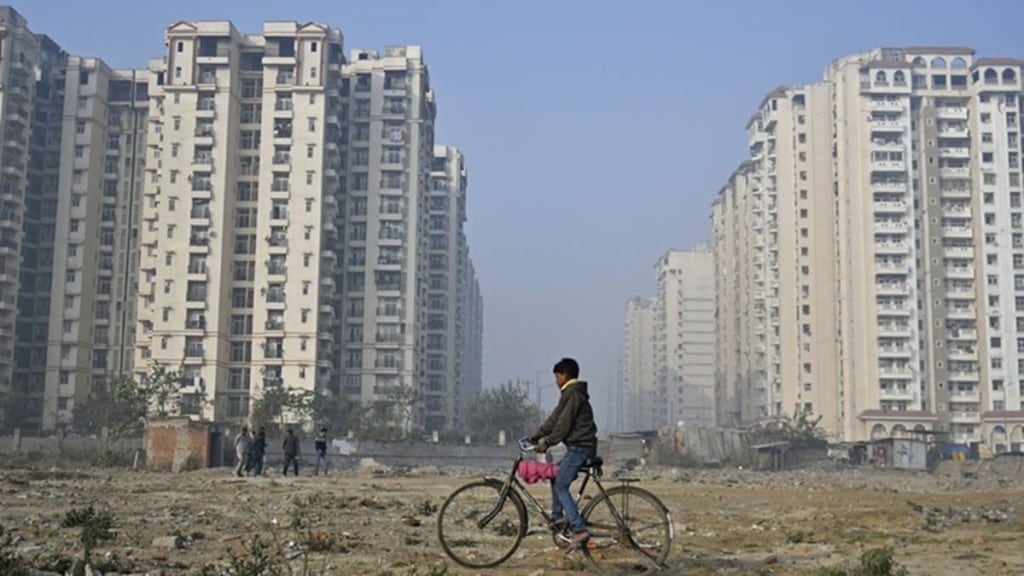The real estate industry is seeking an increase in the price cap of affordable housing from the current Rs 45 lakh to Rs 75-80 lakh in the upcoming Budget 2023-2024. The demand is particularly for metropolitan cities where delivering houses below Rs 50 lakh is difficult due to the high cost of construction and land.
In metropolitan cities like Delhi-NCR, Mumbai, Kolkata, Bengaluru, Chennai and Hyderabad, the definition of affordable housing is a dwelling unit priced at Rs 45 lakh or below and having a carpet area of 60 square metre or below. However, in non-metro cities, while the price of an affordable housing unit is the same Rs 45 lakh or below, the ceiling for carpet area is higher at 90 sq m and below.
As land cost is one of the major components of a real estate project, which in some cases could be as high as 50-60%, the affordability factor varies from city to city.
According to Anshuman Magazine, Chairman & CEO (India, South East Asia, Middle East & Africa), CBRE, the limit for affordable housing was set a few years ago and a revision could be considered, given the inflationary scenario. “The rise in key input costs have made it even more difficult for the developers to maintain the profitability of projects, and the price rise in turn is passed on to end-users,” he said.
Also read: 4 things you must know about Loan Against Property – Check lowest interest rates
“In a city like Mumbai, the definition of affordable housing limits developers’ ability to deliver inventory priced below Rs 50 lakh makes it difficult for the benefits to accrue in urban areas, so if it can be raised to something like Rs 75 lakh or something, you can broad base the reach of the scheme,” said Ghulam Zia, executive director, Knight Frank India.
Additionally, the affordable housing project registration deadline to avail tax holiday under Section 80IBA has lapsed, and consultants said it is important to revive the measure to boost the viability of affordable housing projects.
“The 100% tax holiday for affordable housing projects under Section 80IBA, was available for projects which are approved till March 31, 2022. This section allowed developers to claim 100% tax exemption on profits subject to several qualification criteria including the approval deadline. Since this is arguably the most materially meaningful measure, we believe it is important to revive this measure once again,” said Knight Frank India in a note.
Also read: M&M Financial, HUL, Marico, ICICI Bank, Coal India, HPCL, GR Infraprojects, NTPC stocks in focus
Developers said that high taxation on affordable housing is also a dampener for the growth of the housing segment, and are asking for concessions in the GST rates levied for the segment, along with continuation of the benefits under Credit Link Subsidy Scheme (CLSS).
Atul Goyal, chief financial officer, Brigade Enterprises, said: “The government should consider reinstatement of the concessional GST rate of 12% on works contract services provided to the affordable housing projects till such time the projects obtain the completion certificate.”
“Currently, for property that falls under the affordable housing bracket of Rs 45 lakh, close to about 25% to 30% goes on taxes. So, it is imperative for the government to remove GST for affordable housing or reinstate input tax credit so that the benefit can be passed on to the customer,” said Murali M, chairman and managing director, Shriram Properties.
“The government should rationalise GST rates for construction materials like steel, cement and tiles. The subsidy under the CLSS has been a big saving and motivation and should be continued to achieve the ‘Housing for All’ mission,” said Pradeep Aggarwal, founder & chairman, Signature Global (India).
Under CLSS, beneficiaries of economically weaker section (EWS), low-income group (LIG) and middle-income group (MIG) can seek housing loans from banks, housing finance companies and other such institutions for acquisition or construction of house and enhancement to existing dwellings as incremental housing. The benefit is available to EWS households with an annual income up to Rs 3 lakh, LIG households with an annual income of more than Rs 3 lakh and up to Rs 6 lakh, while for MIG households with an annual income of more than Rs 6 lakh and up to Rs 18 lakh.

